Browse
Agri Food Systems
9 PhD Scholarships Available with Animal Health Innovation Lab
The Animal Health Innovation Lab in partnership with the University of Nairobi is offering 9 PhD scholarships. The fully funded positions, offered by USAID, will develop research and lab-based solutions to the East Coast Fever. In Kenya and East Africa, this tick-borne disease of cattle has created constraints to human nutrition and economic welfare. The multi-institutional and multi-disciplinary environment offers a unique opportunity for those seeking a PhD in a main research project at the Animal Health Innovation Lab.
The application deadline is Feb. 10, 2021 at 23:59pm. Review the link and photo to apply!
https://uonbi.ac.ke/news/feed-future-animal-health-innovation-lab-phd-scholarships
By:
Madeleine Futter
Monday, Aug 16, 2021
AGRI-FOOD SYSTEMS
+2

Leave a comment
Making Food systems Equitable: An African Dialogue on Gender and Food Systems
In countries where women are most marginalized, discriminated under the law and where gendered norms prevent women from owning property and resources, people are also the hungriest. This is because gender equality and food systems are intertwined. However, too often, we only focus on the roles that women play in production, processing, trading of food and in making decisions about consumption and purchase of food at household level. And while this is important, we must also focus on whether the food system as organized is just and equitable and whether it promotes the empowerment and livelihoods and health of women and girls. Stark gender inequalities are both a cause and an outcome of unsustainable food systems, unjust food access, consumption and production. Tackling gender injustice and truly empowering women is not only a fundamental prerequisite for food systems transformation but also a goal.
This dialogue is one in a series of regional dialogues to discuss how we can achieve the triple goal of gender equality, sustainable and healthy food systems. It will bring together scientists, farmers and farmer organizations, policy makers, consumers, private sector and others to discuss and share solutions on guaranteeing land rights for women, rural women’s economic empowerment, women’s voice and decision making in food systems, bridging the gender technology gap and more.
Key outcomes of the dialogue include: (i) a set of solutions and commitments for gender equality in food systems (ii) an African position on what commitments are needed to achieve gender equality in food systems for the UN Food Systems Summit (iii) a community of practice to advance commitments on gender equality in food systems.
To take part in the dialogue, please visit the Summit Dialogues website
By:
Derek Tobias
Monday, Aug 16, 2021
AGRI-FOOD SYSTEMS
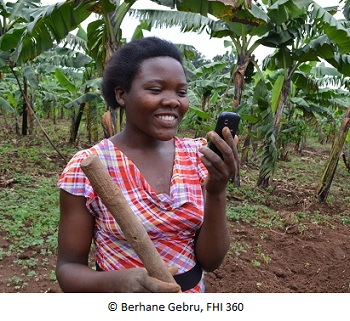
No Preview Available
Leave a comment
Happy festive season to all the guys on the APP bridge
Merry Christmas. Kindly check out this news story about our AgAP program in the New Vision online press, Link Here. https://www.newvision.co.ug/news/1536048/us-embassy-st-lawrence-university-partner-promote-agribusiness
Enjoy the festive season.
By:
Raymond Musiima
Monday, Aug 16, 2021
AGRI-FOOD SYSTEMS

Leave a comment
US Department of State PFP Alumni of the AAP-MSU at Michigan Fellows Agricbuisness Initiative (MFAI) wish everyone at the bridge a happy festive season.
By:
Raymond Musiima
Monday, Aug 16, 2021
AGRI-FOOD SYSTEMS
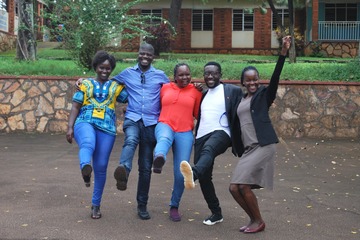
Leave a comment
Africa: How The Digital Revolution Can Help Level The Playing Field for African Women in Agriculture
The race to limit the spread of Covid-19 has, through necessity, accelerated many other transformations that were already under way, including the digital revolution in African agriculture. What had previously been a growing but limited shift towards the use of digital tools and technologies for food production and business has become a lifeline in the face of market restrictions, food insecurity and lockdowns. And among the biggest winners have been women.
https://agra.org/news/africa-how-the-digital-revolution-can-help-level-the-playing-field-for-african-women-in-agriculture/
By:
Amy Jamison
Monday, Aug 16, 2021
AGRI-FOOD SYSTEMS
No Preview Available
Leave a comment
Call for Applications: Michigan Fellows Agribusiness Initiative - Uganda's (MFAI-UG) Agribusiness Apprenticeship Program
By:
Derek Tobias
Monday, Aug 16, 2021
AGRI-FOOD SYSTEMS

Leave a comment
AFAP Transforming Lives Publication
AFAP is proud to present the digital version of the “Transforming lives stories” publication for 2020. This e-publication features AFAPs successes and impact on Agribusiness and smallholder farmers in Burkina Faso, Ghana, Malawi, Mozambique, Tanzania and Uganda.
We would like to extend a heartfelt gratitude to all our colleagues and editors who efficiently documented the stories. Finally, we deeply thank our donors that have financially supported AFAP’s work in the agricultural inputs and agribusiness value chain in Africa. With your support we are in changing lives, empowering families and transforming communities.
Click here to read our e-publication
Download a pdf copy
By:
Elaina Lawrence
Monday, Aug 16, 2021
AGRI-FOOD SYSTEMS

No Preview Available
Leave a comment
Arrival day of the 2nd Cohort of the AgAP in a single pic. Welcome our MFAI apprentices!
By:
Raymond Musiima
Monday, Aug 16, 2021
AGRI-FOOD SYSTEMS
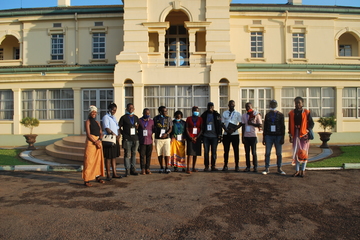
Leave a comment
Michigan Fellows Agribusiness Initiative (MFAI) is happy to inform all partners, friends and wellwishers that the Agribusiness Apprenticeship Program (AgAP) 2nd Cohort is starting this Sunday 6th December to 11th December at St Lawrence University in Kampala. Join our online streaming on our Facebook page and the AAP bridge for updates.
By:
Raymond Musiima
Monday, Aug 16, 2021
AGRI-FOOD SYSTEMS
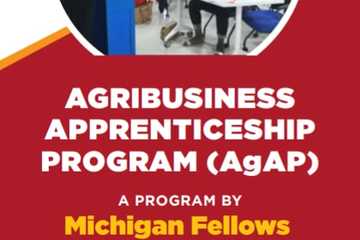
Leave a comment
Uganda – From hate to love: Ochakolong’s agricultural journey
Growing up, Ochakolong Esukaya, a now second-year student of agribusiness management at Busitema University in Soroti, detested farming. To him, farming was a form of punishment. Back in primary school, he explained, farming and especially weeding were activities for latecomers and students who misbehaved.
Having grown up in a farming household, Ochakolong continued to farm. In February and May 2020 during the long rains, he was selected by Acila Enterprises Ltd to be one of two host farmers for a demonstration garden at Busitema University. Acila Enterprises is one of the AFAP-supported hub agro dealers that received funds for demand creation. He was allocated 600 tomato seedlings of the Kilele F1 variety. With the provided seedlings, Ochakolong managed to achieve 95% germination. On a 40m by 20m plot, he grew 1300kg from the garden, which was worth 1.3 million shillings ($ 371). The cost of production on his side was zero apart from his time since the demo plot was fully funded through AFAP funds. As a result of his commitment,
Acila Enterprises allocated him the funds earned to reinvest and also to buy some sachets of Kilele, which he was to sell to neighbouring farmers. Ochakolong sold 109 sachets of Kilele F1, each of which cost 62 000 shillings (approximately $17). Acila paid him a commission 1000 Ugandan shillings ($0.02) per sachet.
To continue reading, please visit the AFAP website
By:
Derek Tobias
Monday, Aug 16, 2021
AGRI-FOOD SYSTEMS
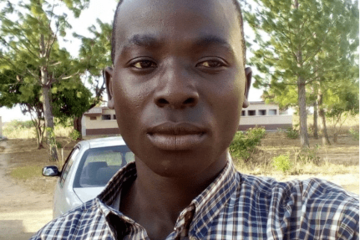
Leave a comment
A New Home! | Unveiling Africa's First Women in Agribusiness Digital Marketplace
Click on the link below to register!
https://register.gotowebinar.com/register/7953468402877216268
By:
Elaina Lawrence
Monday, Aug 16, 2021
AGRI-FOOD SYSTEMS
+1

Leave a comment
FAO webinar on September 30, 2020-- The Power of Youth for Agricultural Transformation: A View from Sub-Saharan Africa
Register here:
https://fao.zoom.us/webinar/register/WN_vbCB0KdPSrGYfAjcRIeArg
By:
Amy Jamison
Monday, Aug 16, 2021
AGRI-FOOD SYSTEMS
+1
No Preview Available

Leave a comment